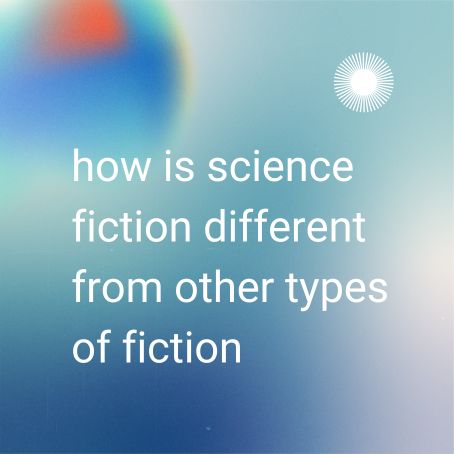Unlike other forms of literature, this fiction genre incorporates various themes in science and technology which can be deemed as extraordinary and creative. These dimensions differentiate literature with science fiction, making it distinctively different.
Themes and Focus
- Science Fiction: While this genre evolves, it often portrays the future, society and, most importantly, technology. This is to say that sci-fi literature revolves around the possibilities of space travel, artificial intelligence, time travel, and many futuristic technologies.
- Other Fiction: While romance, mystery or even historical fiction may include new technologies or advancements, it predominantly focuses on relationships and emotion throughout the story while avoiding the future and other themes.
Setting
- Science Fiction: Futures societies that are technologically advanced, outer space, or multiverses are the common settings in which you can find sci-fi literature. Disregarding the storylines, these places include technology or ideas that have not been invented yet.
- Other Fiction: This genre includes books that are set in the current time, past, or developed places and events that correlate to the present day or during the time period of the book.
Basis in Science and Technology
- Science Fiction: As the name suggests, fiction combined with reality is viewed as a standard as for some, this combination is empowering. Specifically, sci-fi is built on scientific theories and principles with a significant focus on advanced imagination.
- Other Fiction: Science and technology are sketchy at best with a fantasy novel since magic and every supernatural ability would lack facts.
Idea Analysis
- Science Fiction: These highlight societal or ethical dilemmas brought about by technological advancements, for example, whether it is ethical to create powerful AI or engineer human genetics.
- Other Fiction: More focused on universals of human life and action such as love, treachery, betrayal, or self-exploration but does not have the same speculative angle.
Subgenres, Intersections and Fusion
- Science Fiction: Hard and soft sci-fi, dystopian and cyberpunk are common subgenres of this genre.
- Other Fiction: This genre abuts and even overlaps onto SF into speculative writers such as fantasy writers; Star Wars is a classic example of SF with some fantasy elements to it or thriller writers such as Michael Crichton who mixes science fiction with thriller suspense in books like Jurassic Park.
Putting it another way, science fiction has a unique perspective as all the applications of ideas in science and technology are viewed through the microscope of possibilities and probabilities.Copy
in che modo la fantascienza è diversa dagli altri tipi di narrativa?
A differenza di altre forme di letteratura, questo genere di narrativa incorpora vari temi di scienza e tecnologia che possono essere considerati straordinari e creativi. Queste dimensioni differenziano la letteratura dalla fantascienza, rendendola distintamente diversa.
Temi e focus
Fantascienza: mentre questo genere si evolve, spesso ritrae il futuro, la società e, soprattutto, la tecnologia. Questo per dire che la letteratura di fantascienza ruota attorno alle possibilità di viaggi spaziali, intelligenza artificiale, viaggi nel tempo e molte tecnologie futuristiche.
Altra narrativa: mentre il romanticismo, il mistero o persino la narrativa storica possono includere nuove tecnologie o progressi, si concentra prevalentemente su relazioni ed emozioni durante la storia, evitando il futuro e altri temi.
Ambientazione
Fantascienza: società future tecnologicamente avanzate, spazio esterno o multiversi sono le ambientazioni comuni in cui puoi trovare letteratura di fantascienza. Ignorando le trame, questi luoghi includono tecnologia o idee che non sono ancora state inventate.
Altra narrativa: questo genere include libri ambientati nel tempo attuale, passato o luoghi ed eventi sviluppati che si collegano al presente o al periodo di tempo del libro.
Basi in scienza e tecnologia
Fantascienza: come suggerisce il nome, la finzione combinata con la realtà è considerata uno standard poiché per alcuni questa combinazione è rafforzante. In particolare, la fantascienza è basata su teorie e principi scientifici con un’attenzione significativa all’immaginazione avanzata.
Altra narrativa: scienza e tecnologia sono al massimo approssimative in un romanzo fantasy poiché la magia e ogni abilità soprannaturale mancherebbero di fatti.
Analisi delle idee
Fantascienza: evidenziano dilemmi sociali o etici causati dai progressi tecnologici, ad esempio, se sia etico creare una potente intelligenza artificiale o progettare la genetica umana.
Altra narrativa: più incentrata sugli universali della vita e dell’azione umana come amore, tradimento, tradimento o auto-esplorazione, ma non ha lo stesso angolo speculativo.
Sottogeneri, intersezioni e fusioni
Fantascienza: fantascienza hard e soft, distopica e cyberpunk sono sottogeneri comuni di questo genere.
Altra narrativa: questo genere confina e persino si sovrappone alla fantascienza in scrittori speculativi come gli scrittori fantasy; Star Wars è un classico esempio di fantascienza con alcuni elementi fantasy o scrittori di thriller come Michael Crichton che mescola fantascienza e suspense thriller in libri come Jurassic Park.
In altre parole, la fantascienza ha una prospettiva unica poiché tutte le applicazioni delle idee nella scienza e nella tecnologia sono viste attraverso il microscopio delle possibilità e delle probabilità.

